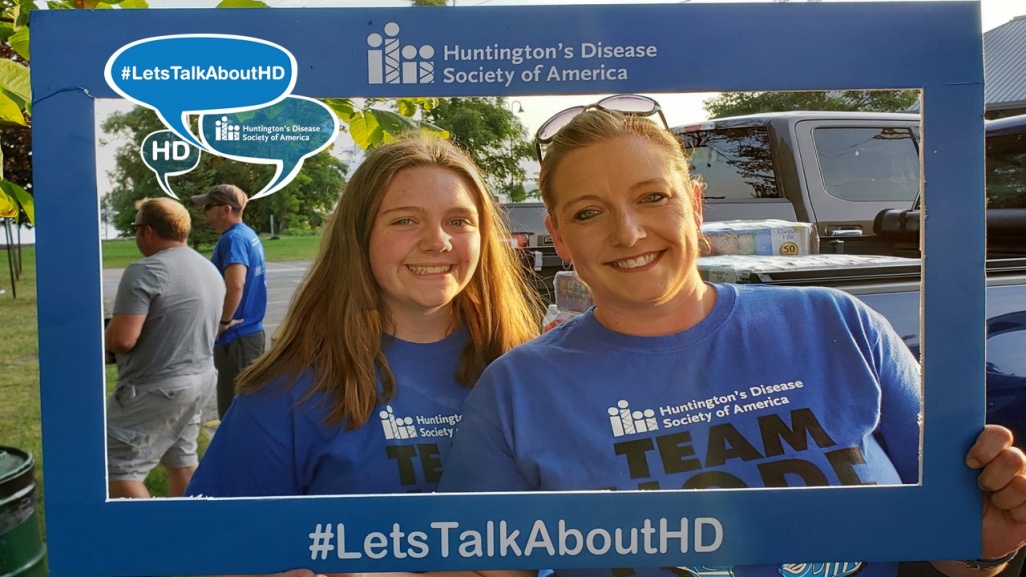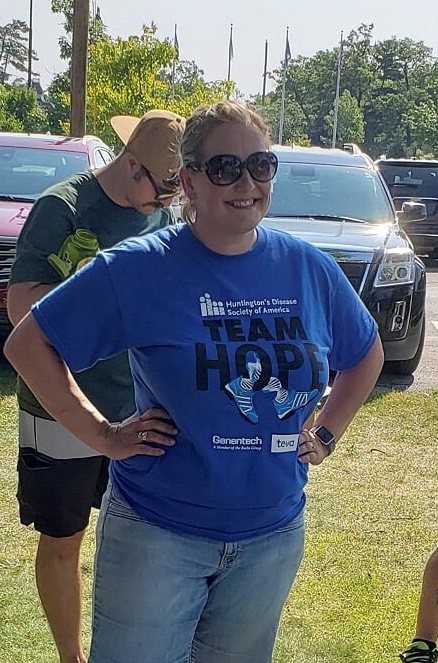
By Matthew Santamaria (msantamaria@hdsa.org)
From a young age, Michigan resident Jennifer Ferris always knew her mother was ill and never lived a healthy life. When her mother was 20-years-old, she tested positive for the gene that causes Huntington’s disease (HD).
HD is a fatal genetic disorder that causes the progressive breakdown of nerve cells in the brain. It deteriorates a person’s physical and mental abilities usually during their prime working years and has no cure.
“Even when I was very young, I tried my best to help take care of my mother,” Jennifer explains. “It broke my heart, and I cannot imagine what it did to her.”
The symptoms of the disease can be described as ALS, Parkinson’s, and Alzheimer’s diseases simultaneously. Symptoms include personality changes, mood swings, depression, forgetfulness, impaired judgement, unsteady gait, involuntary movements, slurred speech, difficulty in swallowing, and significant weight loss.
“One time, she had fallen and cracked her head open. She needed staples and there were also other multiple times she fell and was hurt,” said Jennifer. “She was bruised more than she wasn't. She had a walker and a helmet but it still happened.”
By the time Jennifer was 13-years-old, her mother was placed in a nursing home because she needed 24/7 care. When Jennifer was 19-years-old, her mother passed away.
“She lived in that nursing home until her dying day seven years later,” Jennifer explains. “Her last year with us she was completely not there. She had already been bed ridden for years but towards the end, she seemed gone. Her eyes were glossy and she never made eye contact. As sad as it was to lose her at least then we knew she was finally free and out of pain.”
Jennifer knew that the HD battle may not be over. Every child of a parent with HD has a 50/50 chance of inheriting the faulty gene that causes Huntington’s disease. She has children that would be at risk as well.
“If any part of my body twitched or if I lost my balance, I was sure it was a sign I had what took my mother,” said Jennifer. “I was scared and convinced I had HD.”
Jennifer would set up the genetic testing process many times and kept backing out. In 2016, she was ready to be tested for HD.
The decision to be genetically tested is difficult to make. Each year, 5-10% are tested. It is never the right or wrong decision to be tested. There are people that see no benefit in knowing that they will develop the disease while others want to know in order to make informed choices about their future. It can take up to several weeks to receive your results from the genetic testing center.
“This was not a simple blood test,” Jennifer explains. “Before I could get my results, I saw a psychologist, psychiatrist, neurologist and a genetic counselor. All minds combined had to agree that I was ready to receive my results, no matter what they were.”
Jennifer tested negative for the HD gene.
“I was sure I had every symptom and CONVINCED I had this disease,” said Jennifer. “I could not believe it. At first, I felt relieved and it was a huge weight had been lifted off my shoulders. However, I then felt sad for those living with the disease and for others out there still at risk.”
Jennifer and her family are still involved in the HD Community. Since 2012, Jennifer has organized the HDSA Team Hope Walks. Team Hope Walks aim to raise as much money possible in the local community to support the mission and services of the Huntington’s Disease Society of America.

“Sometimes, I feel guilty for not having the disease,” said Jennifer. “I am a healthy, middle-aged woman, and I worry that the people I see at the walk are jealous or angry at me. I know I would be. Other times, I wonder if I should let someone else take over the walk.”
Jennifer continues:
“But then I remember, I lost my mother to this debilitating disease. My children never knew their grandmother. I know the heartache of caring for someone with Huntington’s, and I understand the fear of being at risk. I know what it’s like to lose someone to HD.”
###
Huntington’s disease is a fatal genetic disorder that causes the progressive breakdown of nerve cells in the brain. It deteriorates a person’s physical and mental abilities usually during their prime working years and has no cure. Every child of a parent with HD has a 50/50 chance of inheriting the faulty gene that causes Huntington’s disease. Today, there are approximately 41,000 symptomatic Americans and 200,000 at-risk of inheriting the disease. In less than 10% of cases, juvenile Huntington’s disease (JHD) affects children & adolescents. JHD usually has a more rapid progression rate than adult onset HD; the earlier the onset, the faster JHD progresses. HD is described as having ALS, Parkinson’s and Alzheimer’s diseases – simultaneously. HD is characterized by a triad of symptoms, including progressive motor dysfunction, behavioral disturbance and cognitive decline.
The Huntington’s Disease Society of America is the premier nonprofit organization dedicated to improving the lives of everyone affected by HD. From community services and education to advocacy and research, HDSA is the world’s leader in providing help for today and hope for tomorrow for people with HD and their families.
To learn more about Huntington’s disease and the work of the Huntington’s Disease Society of America, visit www.HDSA.org or call 1(800)345-HDSA.
This is a story featuring a personal experience with Huntington’s disease. If you would like to have your story told please contact Matthew Santamaria at msantamaria@hdsa.org
From a young age, Michigan resident Jennifer Ferris always knew her mother was ill and never lived a healthy life. When her mother was 20-years-old, she tested positive for the gene that causes Huntington’s disease (HD).
HD is a fatal genetic disorder that causes the progressive breakdown of nerve cells in the brain. It deteriorates a person’s physical and mental abilities usually during their prime working years and has no cure.
“Even when I was very young, I tried my best to help take care of my mother,” Jennifer explains. “It broke my heart, and I cannot imagine what it did to her.”
The symptoms of the disease can be described as ALS, Parkinson’s, and Alzheimer’s diseases simultaneously. Symptoms include personality changes, mood swings, depression, forgetfulness, impaired judgement, unsteady gait, involuntary movements, slurred speech, difficulty in swallowing, and significant weight loss.
“One time, she had fallen and cracked her head open. She needed staples and there were also other multiple times she fell and was hurt,” said Jennifer. “She was bruised more than she wasn't. She had a walker and a helmet but it still happened.”
By the time Jennifer was 13-years-old, her mother was placed in a nursing home because she needed 24/7 care. When Jennifer was 19-years-old, her mother passed away.
“She lived in that nursing home until her dying day seven years later,” Jennifer explains. “Her last year with us she was completely not there. She had already been bed ridden for years but towards the end, she seemed gone. Her eyes were glossy and she never made eye contact. As sad as it was to lose her at least then we knew she was finally free and out of pain.”
Jennifer knew that the HD battle may not be over. Every child of a parent with HD has a 50/50 chance of inheriting the faulty gene that causes Huntington’s disease. She has children that would be at risk as well.
“If any part of my body twitched or if I lost my balance, I was sure it was a sign I had what took my mother,” said Jennifer. “I was scared and convinced I had HD.”
Jennifer would set up the genetic testing process many times and kept backing out. In 2016, she was ready to be tested for HD.
The decision to be genetically tested is difficult to make. Each year, 5-10% are tested. It is never the right or wrong decision to be tested. There are people that see no benefit in knowing that they will develop the disease while others want to know in order to make informed choices about their future. It can take up to several weeks to receive your results from the genetic testing center.
“This was not a simple blood test,” Jennifer explains. “Before I could get my results, I saw a psychologist, psychiatrist, neurologist and a genetic counselor. All minds combined had to agree that I was ready to receive my results, no matter what they were.”
Jennifer tested negative for the HD gene.
“I was sure I had every symptom and CONVINCED I had this disease,” said Jennifer. “I could not believe it. At first, I felt relieved and it was a huge weight had been lifted off my shoulders. However, I then felt sad for those living with the disease and for others out there still at risk.”
Jennifer and her family are still involved in the HD Community. Since 2012, Jennifer has organized the HDSA Team Hope Walks. Team Hope Walks aim to raise as much money possible in the local community to support the mission and services of the Huntington’s Disease Society of America.

“Sometimes, I feel guilty for not having the disease,” said Jennifer. “I am a healthy, middle-aged woman, and I worry that the people I see at the walk are jealous or angry at me. I know I would be. Other times, I wonder if I should let someone else take over the walk.”
Jennifer continues:
“But then I remember, I lost my mother to this debilitating disease. My children never knew their grandmother. I know the heartache of caring for someone with Huntington’s, and I understand the fear of being at risk. I know what it’s like to lose someone to HD.”
###
Huntington’s disease is a fatal genetic disorder that causes the progressive breakdown of nerve cells in the brain. It deteriorates a person’s physical and mental abilities usually during their prime working years and has no cure. Every child of a parent with HD has a 50/50 chance of inheriting the faulty gene that causes Huntington’s disease. Today, there are approximately 41,000 symptomatic Americans and 200,000 at-risk of inheriting the disease. In less than 10% of cases, juvenile Huntington’s disease (JHD) affects children & adolescents. JHD usually has a more rapid progression rate than adult onset HD; the earlier the onset, the faster JHD progresses. HD is described as having ALS, Parkinson’s and Alzheimer’s diseases – simultaneously. HD is characterized by a triad of symptoms, including progressive motor dysfunction, behavioral disturbance and cognitive decline.
The Huntington’s Disease Society of America is the premier nonprofit organization dedicated to improving the lives of everyone affected by HD. From community services and education to advocacy and research, HDSA is the world’s leader in providing help for today and hope for tomorrow for people with HD and their families.
To learn more about Huntington’s disease and the work of the Huntington’s Disease Society of America, visit www.HDSA.org or call 1(800)345-HDSA.
This is a story featuring a personal experience with Huntington’s disease. If you would like to have your story told please contact Matthew Santamaria at msantamaria@hdsa.org
